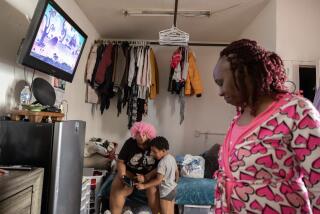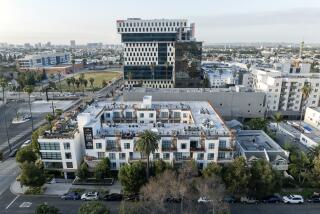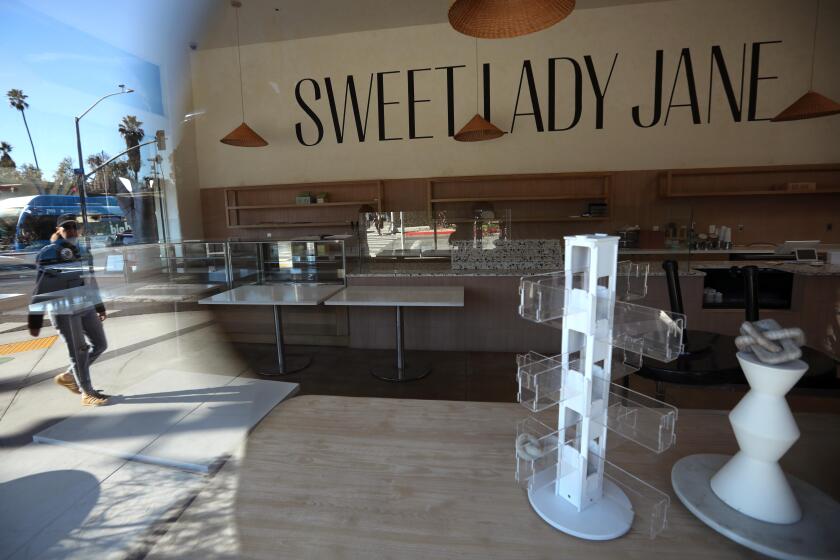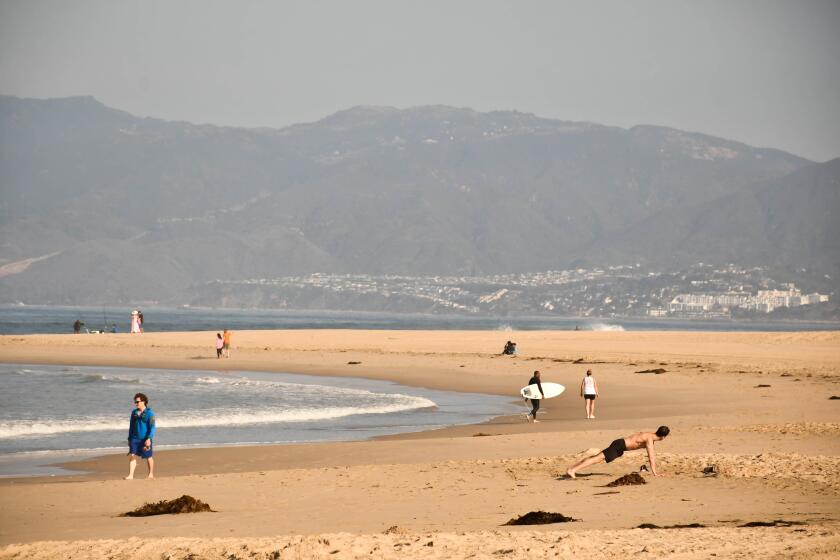Tenants fed up with noise, dust, and water shutoffs from renovations amid coronavirus
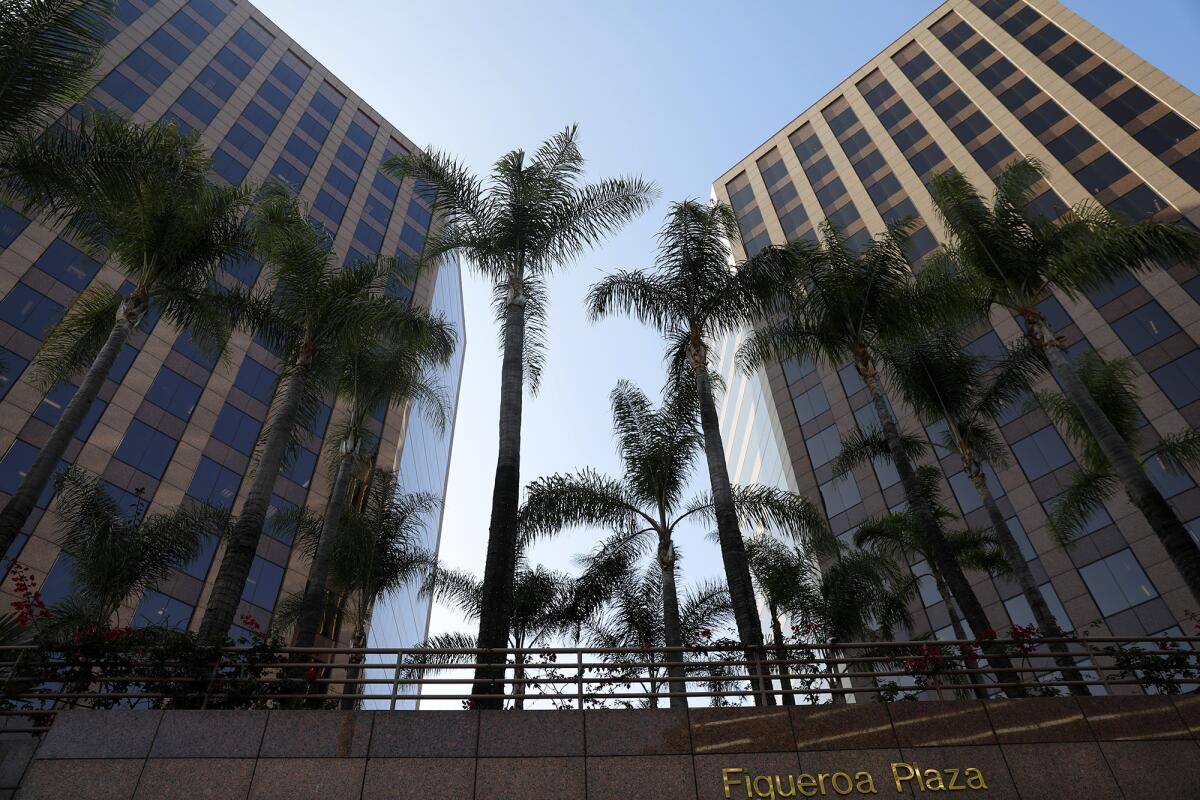
The virus that has spread across the globe has put Kevin Contreras out of work as a security guard, cut the hours that his mother Gloria works cleaning houses, and cooped up their family of four in their one-bedroom apartment in Echo Park.
But for the crews renovating vacant units at their apartment complex, “it’s like it hasn’t affected them,” Contreras said, complaining of dust, noise and workers streaming into the building.
Under a state order, construction workers have been deemed essential during the COVID-19 pandemic, along with plumbers, electricians and others who maintain homes and keep construction sites humming. New houses and buildings are continuing to rise in L.A. neighborhoods during the crisis — work that officials argue is needed to tackle the housing crisis.
Some tenants have been alarmed, however, that hammering and drilling has also continued inside existing buildings as vacant apartments are renovated. Many worry not only about themselves but the safety of construction workers, questioning why such renovations are still being permitted to proceed.
“If it’s empty units you’re going to profit off of,” Contreras said, “I don’t see that as essential.”
Contreras said their water has been shut off repeatedly for much of the day, making it impossible to scrub their hands clean or shower. White dust has forced them to close their windows, his mother said. And so many workers are coming in and out of the building, Contreras said, that they worry about stepping outside.
“We’re basically in jail in our apartment,” the 30-year-old said.
Representatives of TriWest Development, identified as the owner of the property by the real estate data provider CoStar, did not respond to messages seeking comment.
The housing department said Wednesday that renovating vacant units is still permitted, provided that it does not turn off utilities in occupied apartments, cause excessive dust or noise, or involve “extensively invasive” interior work such as removing walls. The department said it is fielding complaints about such issues and will order work to stop if needed.
Such work, ordinarily a headache for neighbors, has become a much bigger frustration as more residents remain in their apartments during the day. In reaction to questions about building renovations during the pandemic, Los Angeles Mayor Eric Garcetti has warned that city inspectors will be checking to make sure people are at least six feet apart. New guidelines released Tuesday require construction sites to create plans for preventing COVID-19 exposure.
“We will not be shy about shutting down construction sites that do not comply,” Garcetti said Tuesday.
Some renters have questioned why renovation work is continuing during the crisis. “It’s not like they’re making lower-income housing,” said Los Feliz resident Jackie Gonzalez-Durruthy. “They’re renovating and flipping units to hike up the rent and continue gentrifying this neighborhood.”
Gonzalez-Durruthy said that drilling and hammering in empty units in her building has made it impossible for her husband, whose job involves recording videos, to do that work until crews wrap up. At one point, their water was shut off for several hours to repair a pipe. A property manager for the Los Feliz building declined to comment.
Elena Popp, executive director of the Eviction Defense Network, said that disruptive construction can be a deliberate tactic to get tenants to move. Such “eviction by jackhammer” practices could be even more pernicious when people are stuck at home, Popp said.
“People are at home and their nerves are already completely frayed. Not being able to escape the noise is causing even greater amounts of stress for those that are going through it,” Popp said.
Daniel Yukelson, executive director of the Apartment Assn. of Greater Los Angeles, said that major renovations seem to have slowed, not accelerated, during the pandemic because it is harder for landlords to find contractors to do the work. His association has advised landlords to delay “routine maintenance” when possible and “take care of emergencies first.”
But tenants who hear drilling “often do not know the difference between a minor unit rehab and a major renovation,” Yukelson said. With so many people at home, “any noise may be considered bothersome.”
In Westlake, Alexis Lewis knows she is lucky to still be working from home during the coronavirus crisis, taking phone calls and video chats for her marketing job. But Lewis said the dust and the din from work in the vacant apartment next door were grating on her nerves — and “honestly I’m losing it.”
At one point, she said, she had to close her windows to keep dust from streaming into her home. “When there’s a respiratory illness going around, it seems really counterproductive,” Lewis said.
A building representative says the work is needed: Brian Massie, a principal in the company that owns the Westlake property, said the only apartments that had been undergoing work there were units that had been “pre-leased” to people already expecting to move into the building, ensuring they were ready to be turned over to tenants.
“We’ve already committed to providing that housing for those future residents,” Massie said. “Once those units have been completed, renovations will cease indefinitely until such time we deem it safe and appropriate to continue.”
Massie added that they were “taking every possible precaution to prevent noise and dust and disturbance to the residents who we know need to stay at home,” including equipping workers with face masks and gloves and taping off doors and windows to limit dust. “We care about our residents.”
Some tenants have also raised concerns about new construction, questioning if it is truly essential at this time. In Koreatown, Sae Hee “Keshy” Jeong has been aggravated by the work proceeding on a site overlooked by their window.
“I can’t escape the noise. I can’t escape the dust. I’m home all day. I can’t focus on anything,” said Jeong, who said they are at higher risk during the COVID-19 pandemic because of a childhood illness that affected their lungs.
Jeong wants construction to be halted and the workers to get paid leave. At one point, the 23-year-old Cal State L.A. student staged a protest outside the site.
Other parts of California have put stiffer restrictions on construction. In Santa Clara County, construction is only allowed to continue if it falls into eight specific categories, including building affordable housing or crucial infrastructure or doing repairs needed to ensure that residences are “safe, sanitary, or habitable.” San Francisco advises on its website that if a remodeling project is “purely cosmetic and can be safely delayed, it may not continue.”
More to Read
Sign up for Essential California
The most important California stories and recommendations in your inbox every morning.
You may occasionally receive promotional content from the Los Angeles Times.
